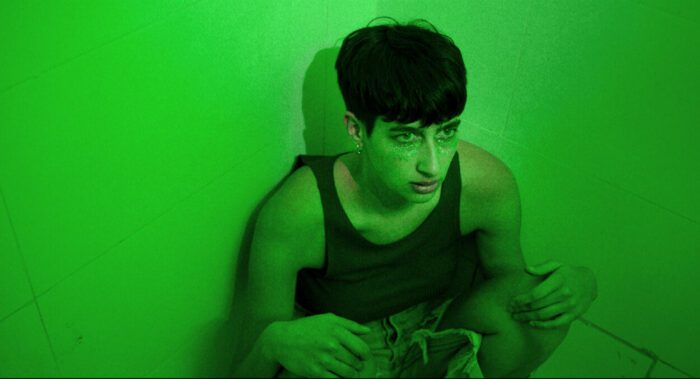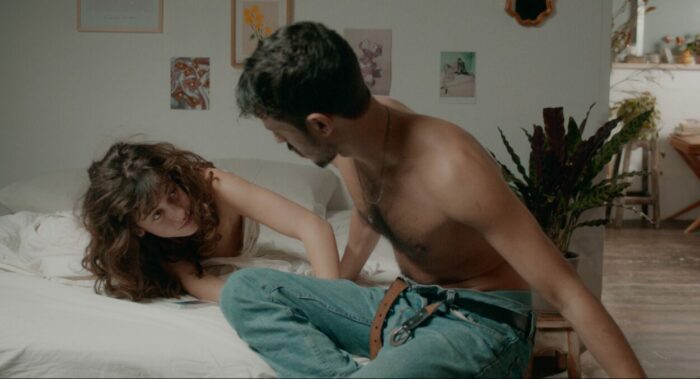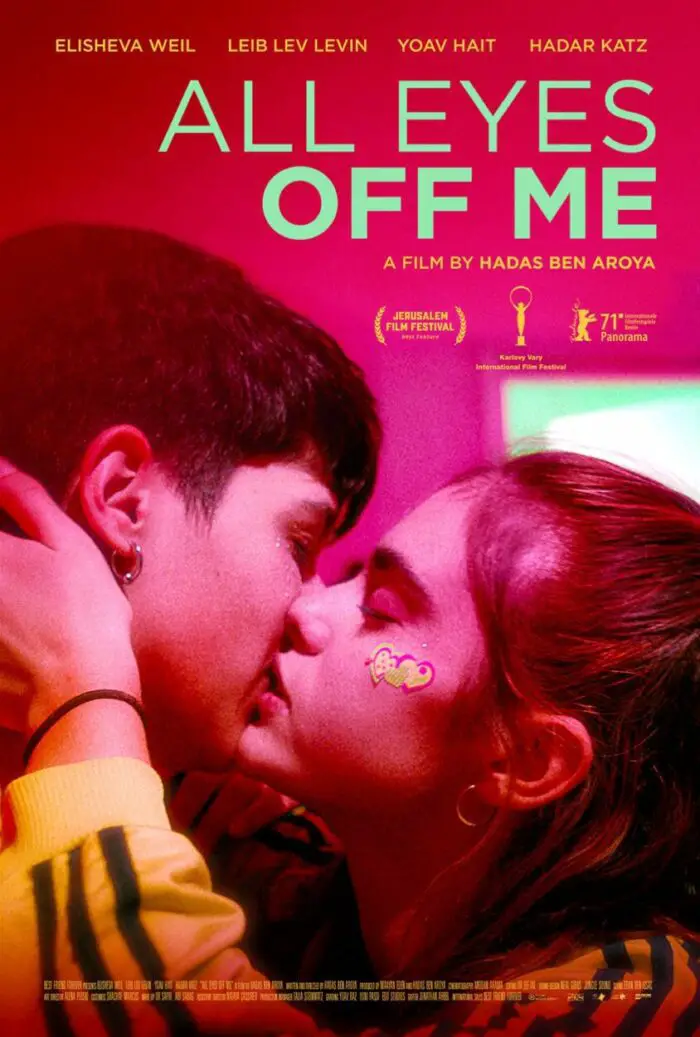All Eyes Off Me, the second feature film from young Israeli filmmaker Hadas Ben Aroya, is nothing if not provocative. Its three young central characters are each exploring their developing sexual desires and identities with various degrees of satisfaction, and in presenting them, the film charts their experiments with an uncommon frankness. Less a single causal story than a loosely woven entanglement of narrative threads, All Eyes Off Me examines the everyday ennui and sexual experimentations of its charismatic young cast of characters.
Set in Tel Aviv, All Eyes Off Me begins with a single, slow close-up of a butterfly on concrete, a less-than-subtle symbol of metamorphosis in a sterile environment witnessed by young Danny (Hadar Katz) on her way to a party. Once there, Danny, a tall and socially anxious girl with a butch cut and glittery eye makeup, makes her way through a neon haze of drugs and promiscuity in her search for a boy named Max. She declines a drink, casually announcing her pregnancy and intention to get an abortion “sometime this week.” A girl in a track jacket stops her for a passionate embrace and kiss, but Danny seems determined to find and give Max the news.
When Danny does find Max (Leib Lev Levin), he’s canoodling with another girl, Avishrag (Elisheva Weil), and the surprise seems to put Danny off her game. Rather than tell him of the pregnancy, she fumbles about, first with a butterfly metaphor Max can’t follow, then with a circuitous story about a past affair gone wrong, an awkward attempt to warn him off his new romance. Unsurprisingly, Max doesn’t get the drift and returns to his date. The whole twelve-minute sequence, from Danny’s arrival to Max’s dismissal of her, presents in something close to real-time: the few cuts are carefully occluded, giving the scene the feel of a long take (it isn’t, quite, but some shots last more than a minute).
The style of this first sequence is one that places a premium on the actors: a small flub can require a second take of the whole shot, so knowing one’s lines and marks is especially crucial. So too are the complex movements of the actors and camera in and out of the tight hallways and crowded rooms as we follow Danny through the party looking for Max. It’s a marvelously technically accomplished scene, made to feel organic and authentic through the cast’s nuanced performance and Ben Aroya’s adroit direction.

Katz’s performance in the sequence is so convincing it’s a shame her character doesn’t reappear in the second and third of the film’s vignettes. But the second, focusing primarily on Avishag’s relationship—if that is the right word—with Max, is no less convincing. It doesn’t feature the same narrative focus or technical dexterity of the first vignette, but as Avishag and Max, Weil and Lev Levin are no less persuasive as a couple whose sexual experiments are predating any of the more mundane pleasures from which a relationship might develop.
Avishag wants her sex rough. Choking, slapping, bruising rough. Max, who has been himself experimenting with gay sex—aside from his fling with Danny—is willing, if nervous, to abide. Ben Aroya’s scenes engaging the two in Avishag’s fantasy are fully explicit, in case you are at all triggered by such depictions: it’s the kind of work that will keep an on-set intimacy coordinator fully engaged. The sex scenes themselves are shot with a frankness and candor of the long-take medium long shot that eschews any camera or editing tricks for a naturalistic performance.

But for all of Avishag’s desires and Max’s willingness to oblige, the sex itself doesn’t really seem to satisfy either of their needs for human connection. For Avishrag in particular—with whom the film spends the most time—she turns to her phone for pleasure, seeking comfort in the routine of streaming singing competitions. It’s something of a performance, by the way, to watch her and Max managing foreplay while holding smokes, drinks, and their omnipresent phones: I took from this that the devices offered some minor pleasures but constantly distracted from others, especially those of genuine human companionship.

If in prior decades the mirror was the one singular device for conveying a character’s self-reflection (in M, Written on the Wind, Purple Noon, Seconds, Taxi Driver, Rocky, La Haine, 25th Hour, Black Swan, Nightcrawler, and dozens more), is the selfie-mode front-camera cellphone-shot the contemporary analogue for disaffected Gen-Zers? Perhaps so, but it’s hard to say whether Avishrag finds any insight in the image her device reflects.
A final sequence has Avishrag seek companionship with her employer, an older man named Dror (Yoav Hait) for whom she dog-sits. There, it seems, in his larger house and with his dogs she might find what her more adventurous sexual exploits with Max couldn’t provide. Potbellied and balding, Dror seems like an unlikely source of the beautiful young Avishrag’s sexual attention, but there is clearly something she’s not finding elsewhere. Intimacy with the older Dror, whose days of experimentation seem behind him, takes on a different texture, though there’s little telling whether this unlikely coupling can provide a listless young woman like Avishrag any fulfillment.
That All Eyes Off Me eschews any traditional causal narration for its episodic structure of three vignettes only loosely related to each other makes for an unusual film. Unfortunately, the sequences build towards the least interesting of the three: while Katz, Lev Levin, and Weil each imbue their characters with a shared restless, searching quality, the film loses its momentum in the third sequence, where all the robust anxieties seem to have dissipated into listlessness and Hait’s character feels a bit like an unwelcome-even-in-his-own-home interloper.
In that respect, All Eyes Off Me is the opposite of a similar contemporary film from Iceland, Beautiful Beings, where younger boys explore aggressions that eventually percolate into a boiling violence. In other words, while All Eyes Off Me presents a fascinating conceit and some memorable performances (especially Weil, who is on camera for most of its running time after the opening sequence, and Katz, who ignites its passions but is sadly absent from the rest of the film) in a study of disaffected youth, the film ultimately has, really, nowhere to go other than back into a cocoon in narrative terms. I might find myself wishing for a film slightly different from the one Ben Aroya has written and directed, one which returned to Danny’s story rather than ending where it does on Dror’s floor.
That said, Ben Aroya is undoubtedly a director with remarkable talent and an incredibly promising future. (The opening sequence alone is a testament to her abilities, a scene any accomplished veteran would be proud to have directed.) All Eyes Off Me was made in 2021; Ben Aroya was at the time only 23 years old. She and her cast and crew—notably cinematographer Meidan Arama—have made a film that explores the ennui and experimentations of her generation with an unflinching, uncompromising perspective.

All Eyes Off Me, written and directed by Hadas Ben Aroya, debuts on North American VOD and digital January 20, 2023. In Hebrew with English Subtitles.




